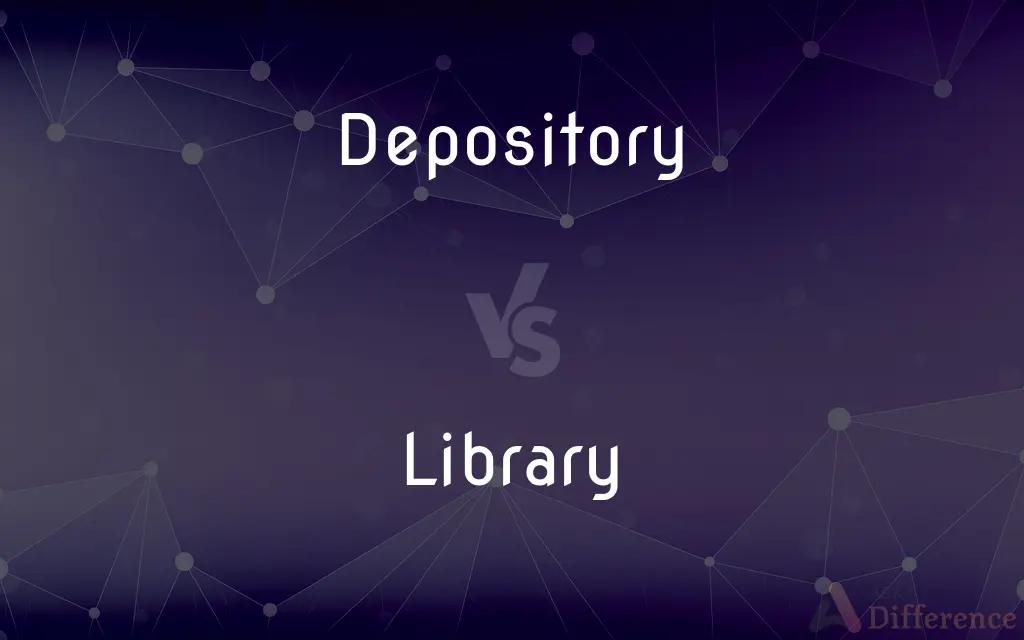Depository vs. Library — What's the Difference?
By Maham Liaqat & Urooj Arif — Updated on April 8, 2024
A depository is a place where items are stored for safety and security, often with restricted access, while a library is an institution that lends books and other media, promoting open access and education.

Difference Between Depository and Library
Table of Contents
ADVERTISEMENT
Key Differences
A depository primarily serves as a secure storage space for various types of items, including documents, valuables, and digital data. The focus is on preservation and safeguarding against loss, damage, or unauthorized access. Items in a depository may be accessible to a limited set of individuals or institutions, and the purpose of storage is often long-term. On the other hand, a library is a curated collection of books, media, and sometimes digital resources that is accessible to the public or a specific community. Libraries emphasize lending, learning, and research, offering services like reading spaces, educational programs, and information assistance.
While depositories often restrict access to their contents to ensure security and preservation, libraries encourage the use and circulation of their materials. Libraries serve as community centers for knowledge and learning, facilitating access to information and promoting literacy and education. In contrast, depositories are more concerned with the containment and protection of items, which might include archival materials, financial documents, or secure digital records.
The management of a depository is usually focused on cataloging and security, ensuring that items are well-preserved and retrievable when necessary. Libraries, however, focus on cataloging for accessibility, user services, and programming to engage their community and support users’ informational and educational needs.
Institutions like national libraries or academic libraries may function as both a library and a depository. They might house rare and valuable collections in a depository-like section with restricted access, while also maintaining general collections for public or academic use. This dual role highlights the complementary nature of depositories and libraries in the broader context of information management and access.
Despite their differences, both depositories and libraries play crucial roles in preserving and providing access to knowledge. Depositories ensure the long-term preservation of valuable or sensitive materials, while libraries democratize access to information, fostering a culture of learning and inquiry.
ADVERTISEMENT
Comparison Chart
Purpose
Secure storage for preservation.
Lending books and media for education.
Access
Restricted to authorized individuals.
Open to the public or specific communities.
Focus
Preservation and security.
Accessibility, learning, and research.
Services
Storage and safeguarding.
Lending, reading spaces, educational programs.
Management
Cataloging for security and retrieval.
Cataloging for accessibility, user support.
Compare with Definitions
Depository
A secure facility for storing valuable items.
The gold bullion is kept in a high-security depository.
Library
Serves as a community hub.
The library hosts weekly events for children and adults.
Depository
May hold digital data securely.
Our company's backups are stored in a digital depository.
Library
Promotes literacy and learning.
Our library's literacy programs have helped many adults learn to read.
Depository
Stores documents for preservation.
The historical documents are stored in a climate-controlled depository.
Library
A place for study and research.
Students spend hours in the library researching for their papers.
Depository
Access is limited to ensure security.
Access to the depository is restricted to authorized personnel only.
Library
Offers digital resources access.
You can access thousands of journals online through the library's website.
Depository
A place where something is deposited, as for storage or safekeeping; a repository.
Library
Lends books and media to the public.
The local library has a great selection of novels and DVDs.
Depository
A place where something is deposited, as for storage, safekeeping, or preservation; a repository.
Library
A library is a collection of materials, books or media that are easily accessible for use and not just for display purposes. It is responsible for housing updated information in order to meet the user's needs on a daily basis.
Depository
A trustee; a depositary.
Depository library
Library
A building or room containing collections of books, periodicals, and sometimes films and recorded music for use or borrowing by the public or the members of an institution
A library book
A university library
Depository
A place where anything is deposited for sale or keeping; as, warehouse is a depository for goods; a clerk's office is a depository for records.
Library
A place in which reading materials, such as books, periodicals, and newspapers, and often other materials such as musical and video recordings, are kept for use or lending.
Depository
One with whom something is deposited; a depositary.
I am the sole depository of my own secret, and it shall perish with me.
Library
A collection of such materials, especially when systematically arranged.
Depository
A facility where things can be deposited for storage or safekeeping
Library
A room in a private home for such a collection.
Library
An institution or foundation maintaining such a collection.
Library
A series of books issued by a publisher.
Library
A collection of standard routines used in computer programs, usually stored as an executable file.
Library
A collection of cloned DNA sequences whose location and identity can be established by mapping the genome of a particular organism.
Library
A collection of proteins generated from the collected DNA sequences that express them, used for tracking metabolic functions of proteins in diseases such as cancer, for the synthesis of new drugs, and for other proteomics research.
Library
An institution which holds books and/or other forms of media for use by the public or qualified people often lending them out, as well as providing various other services for its users.
Library
(by extension) Any institution that lends out its goods for use by the public or a community.
Library
A collection of books or other forms of stored information.
Library
An equivalent collection of analogous information in a non-printed form, e.g. record library.
Library
A room dedicated to storing books.
Library
(computer programming) A collection of software routines that provide functionality to be incorporated into or used by a computer program.
Library
(genetics) A collection of DNA material from a single organism or relative to a single disease.
Library
(card games) The deck or draw pile.
Library
A considerable collection of books kept for use, and not as merchandise; as, a private library; a public library.
Library
A building or apartment appropriated for holding such a collection of books.
Library
A room where books are kept;
They had brandy in the library
Library
A collection of literary documents or records kept for reference or borrowing
Library
A depository built to contain books and other materials for reading and study
Library
(computing) a collection of standard programs and subroutines that are stored and available for immediate use
Library
A building that houses a collection of books and other materials
Common Curiosities
Why are items in a depository often not accessible to the public?
Access is restricted to protect the items from damage, loss, or unauthorized access, ensuring their preservation.
How do libraries support education?
Libraries offer lending services, educational programs, access to digital resources, and spaces for study and research.
What is stored in a depository?
Depositories store valuables, documents, and digital data, focusing on security and preservation.
Can anyone visit a library?
Libraries are generally open to the public or specific community members, promoting access to information.
Can a library also be a depository?
Some libraries function as both, holding general collections for lending and restricted sections for rare or valuable items.
What makes a depository secure?
Security measures can include restricted access, climate control, surveillance, and specialized storage solutions.
What role do libraries play in communities?
Libraries serve as community hubs, offering access to information, promoting literacy, and providing educational programs.
What makes a library a valuable resource for students?
Libraries provide access to a wealth of resources, including books, journals, and digital media, as well as spaces for study and research.
Can the public contribute items to a library or depository?
Libraries often accept donations, but contributions to depositories are typically restricted due to their focus on preservation and security.
How do depositories handle digital data?
Digital depositories use secure servers, encryption, and backup systems to preserve and protect digital data.
How are items cataloged in a depository?
Items in a depository are cataloged with a focus on security, preservation, and retrievability.
What kind of events do libraries host?
Libraries may host book readings, educational workshops, literacy programs, and community events.
How do libraries and depositories differ in their approach to information?
Depositories focus on the containment and preservation of information, while libraries focus on disseminating and making information accessible.
Are digital libraries considered libraries?
Yes, digital libraries provide similar services to traditional libraries but in a digital format, offering access to a wide range of digital resources.
How do libraries and depositories impact the preservation of culture and history?
Both play crucial roles in preserving cultural and historical artifacts, with libraries facilitating access and education, while depositories ensure long-term preservation.
Share Your Discovery

Previous Comparison
Tenosynovitis vs. Tendonitis
Next Comparison
Machine vs. MachineryAuthor Spotlight
Written by
Maham LiaqatCo-written by
Urooj ArifUrooj is a skilled content writer at Ask Difference, known for her exceptional ability to simplify complex topics into engaging and informative content. With a passion for research and a flair for clear, concise writing, she consistently delivers articles that resonate with our diverse audience.
















































